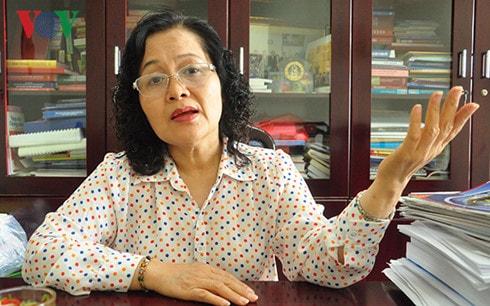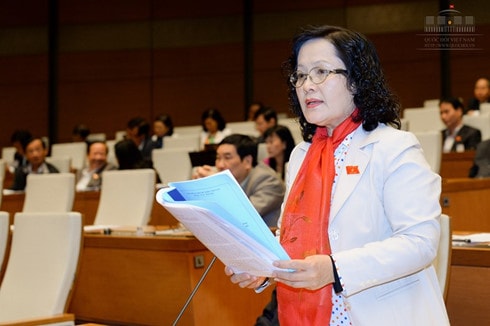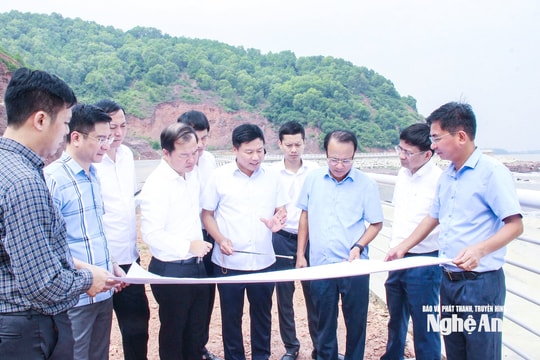"Why do people in positions easily abuse their power, causing loss of people's money?"
“Without regulations on public administration, those in positions of power can easily abuse their power. The loss of state and people's money is also due to that.”
National Assembly Delegate Tran Thi Quoc Khanh – Standing Member of the National Assembly’s Committee on Science, Technology and Environment emphasized this when expressing concerns about public ethics and the legal framework to “control power”. That is also the reason why she proposed to build a Law on Public Administration and persevered for many years of research to perfect it.
"People's money is so easily lost!"
 |
| Delegate Tran Thi Quoc Khanh |
PV:You have struggled for many years with the Public Administration Law project despite facing many difficulties. What made you persevere and take such drastic actions?
Delegate Tran Thi Quoc Khanh:As a person trained in law, having worked in the judiciary and through practice, I realize that there are still legal loopholes, especially in public administration.
In particular, after the Vinalines and Vinashin cases, everyone felt pained by the huge loss of assets. On the National Assembly forum, many delegates had harsh opinions, because this was the people's money, the people's sweat and tears, but why did the agencies and people managing this money dare to do extremely illegal things, causing losses that until today cannot be recovered.
Some people say that this is partly the responsibility of the National Assembly in not creating a legal corridor that is sufficiently closed to strengthen and tighten public administration, public governance, and public asset management. At that time, I wondered: Why is there a lack of laws? Where is the problem? From then on, I decided to research to find the answer.
I started my work by approaching documents and scientific research experts. Reading newspapers, specialized reports, and thematic reports, I marked and recorded any places that mentioned difficult mechanisms or overlapping laws and documents. After working continuously for several years, I clearly saw that the loopholes were too big.
At the Law University, I met teachers who are experts in various fields of law and found that each faculty has its own laws when teaching law, but when teaching about administration, there are no laws but they pick up from this law and that law to say it is administrative law.
Later, I was even more eager to learn more clearly when the delegate Dinh La Thang (at that time the Minister of Transport) once said that there was no school that taught the Minister how to do it. Obviously, the person doing the management work was assigned the responsibility of managing finances and resources, but there was no law that guided people on how to do it.
PV:It is argued that the contents related to public administration have been regulated in many laws?
Delegate Tran Thi Quoc Khanh:It is said that budget management has a budget law, human resources has a law on civil servants and public employees, but that law is only a framework, while in operation there are many things that require leaders to have enough capacity and public ethics to know how to handle work. Because many times there are no general principles to prevent it, so leaders and people with positions and power can be ready to abuse their power.
When the National Assembly considered amending the Constitution, the principle was to strengthen control over power. It sounds like it has all the laws, but in reality, the more you read, the more you see that each ministry and agency that submits laws protects their own interests first, lacking connecting laws. Clearly, this is a huge loophole in public administration, causing leaders and managers to sometimes not know that they are loosening their management and not knowing that they are exceeding their authority.
Research on public administration abroad clearly shows that people promote public ethics and have regulations to prevent abuse of power and control power.
After proposing the need to build this law, some people said that there were already laws so there was no need to do it anymore because it might cause difficulties. That made me research and prove the legal loopholes in public administration.
PV:And that loophole was proven by you and your colleagues?
Delegate Tran Thi Quoc Khanh:Through research, I see that we do not have administrative law but we have the Law on Administrative Penalties, the Law on Administrative Procedures... That shows lameness, vagueness, and difficulty in achieving consistency.
Reforming administrative procedures has not improved much. We have put forward many projects but they are not laws, so they cost a lot of money and are not really effective, and in the end, businesses and people suffer. Until now, ministries and branches have urged each other to cut administrative procedures but have also encountered difficulties because there is no common principle.
Or currently there is no name for "administrative contract" (at least one party in the contract is an administrative agency), while in reality it is being implemented vigorously, so there needs to be regulations to deal with it, and state money cannot be lost through other contracts without a suitable legal mechanism.
Especially when I go to the base, I see more problems. Businesses complain because they have to receive countless inspection teams every year, from fire prevention and fighting, food safety, environmental resources, labor hygiene, tax... up to dozens of teams. That situation is due to lack of coordination.
If you don't do well, you have to resign.
 |
| Delegate Tran Quoc Khanh speaks at the National Assembly |
PV:Can we understand the core spirit of the project that you and your colleagues are building as transparency in roles and responsibilities?
Delegate Tran Thi Quoc Khanh:That is absolutely correct. From the beginning, I relied on the theory of public administration science and administrative law science to have an overview of State management in a scientific way, so that there are no gaps.
The hope is to fill the gaps in the administrative system, so that from managers, civil servants to the people, when looking at the law, they will immediately know, transparently at each level, what they must do, and what will happen if they do not do it, so that people have a basis to monitor them.
Now the law clearly states that this part of the State must be responsible; this part belongs to the leading civil servants, this part belongs to the executing civil servants, this part is supervised by the people.
Whoever you are, when appointed to a leadership position, you must know who to coordinate with, how superiors should behave with subordinates, how equals should coordinate... Currently, there is no law to guide, so it depends on each comrade. Those who are proactive will coordinate well, while others will do it on their own, leading to problems that three or four ministries cannot resolve.
Along with that is the application of information technology, implementation of e-Government to reduce the subjective will of civil servants, ensure publicity, and reduce opportunities for harassment.
To do well the management work also involves inspection and examination of public service. Public service inspection in the current legal system has only 2 articles in the Law on Civil Servants, which cannot solve the problem.
PV:Currently, many incidents occur but responsibility is unclear, is it because of lack of basis, madam?
Delegate Tran Thi Quoc Khanh:In reality, responsibility is often unclear. For example, in the matter of resignation, there is currently only a regulation that says “can resign” but not “must resign”, leading to people not resigning but it doesn’t matter.
Initially, the draft Public Administration Law was expected to include a provision in which cases you must resign. It was so strong that it would put an end to the situation where we always talk softly to each other about “culture of resignation”. There is no culture in this matter. If you do not fulfill your responsibilities, cause bad public opinion, cause losses like that, and make society insecure, then you must resign, not whether you resign or not.
The country is still in difficulty and still has to borrow money, calling on people to save. Every drop of sweat in the fields of farmers, in the factories of hard-working workers like that contributes money to the operating machine but you do not use it properly, you should be ashamed.
Regulations will help to promote public ethics, then you will naturally feel ashamed when invading public resources. In countries where officials only need to hear that the public agency is considering responsibility for a related incident, they will automatically resign. The management of our country must also progress to that level.
PV:What content are you and your colleagues focusing on perfecting and are still wondering about?
Delegate Tran Thi Quoc Khanh:We are conducting a comprehensive review to ensure the legal basis for this law, especially in the period of deep international integration. It is a tool for the State to manage and control power between agencies. In particular, people and businesses are more secure in the process of ensuring their legitimate rights and interests as well as in investment, production and business. Foreign investors can see the transparency.
The bill clearly stipulates a chapter on e-government, including a national portal, a central portal, a provincial portal to the district and commune levels. Anyone who looks at it will see transparency and know where to go to resolve the work, avoiding the situation of not knowing where to go and asking for help here and there, which leads to "illegible" cases./.
Ms. Tran Thi Quoc Khanh has just been elected as a delegate to the 14th National Assembly in Hanoi, becoming one of the few people elected to 4 consecutive National Assembly terms.
Ms. Khanh's proposal for law making was supported by the Government, the National Assembly's Law Committee, and the National Assembly Standing Committee, and it was recommended that the Public Administration Law project be considered for inclusion in the National Assembly's 2016 law and ordinance making program, and submitted to the National Assembly at the 2nd session (October 2016).
Delegate Khanh said that the draft law currently consists of 6 chapters with 60 articles./.
According to VOV


.png)





